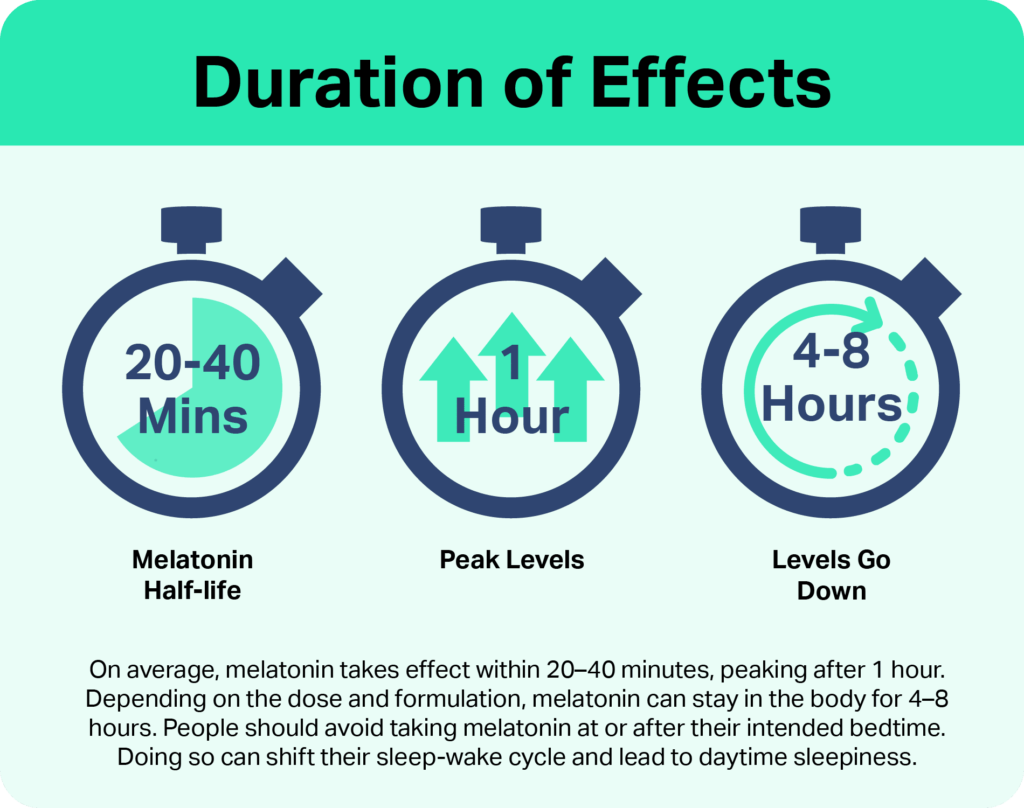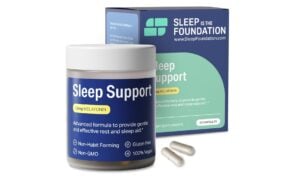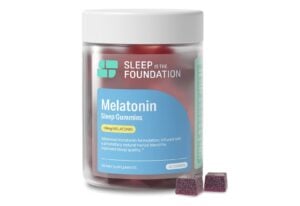How Long Does Melatonin Take to Work?
- Supplemental melatonin typically takes effect within 20-40 minutes.
- The type of supplement and the dose amount will affect onset time.
- Never take more than the recommended melatonin dosage 1 to 2 hours before bedtime.
- Speak to your doctor if sleeping problems do not improve after taking melatonin.
People who struggle to doze off are often curious about options to help them sleep. In fact, nearly one in ten U.S. adults take medicine to help them sleep at least four days a week. The number of people in the U.S. that use melatonin supplements has markedly risen over the last 20 years.
Melatonin, a natural hormone made by the brain to help induce sleep, is also available as a dietary supplement. Several factors can affect how melatonin supplements work and the best time to take them, including an individual’s health, lifestyle, and other medications they are taking. People considering taking melatonin supplements should be aware of these factors, the various forms of melatonin available, and potential safety concerns related to using this common supplement.
How Fast Does Supplemental Melatonin Work?
Ordinarily, the brain makes more melatonin about one to two hours before bedtime and most people start to feel sleepy about two hours after melatonin levels rise.

Supplemental melatonin comes in many different forms and how it is made affects how quickly it works . Depending on the type of supplement, the effects may kick in as quickly as 20 minutes. People considering taking melatonin supplements should talk to their doctors about what form of melatonin may work best for them.
Extended-Release Melatonin
Some pills have a special coating or additive to slow the release of the active ingredient. These kinds of medications and supplements are sometimes called extended-release, controlled-release, sustained-release or modified-release. Extended-release pills take effect more slowly and work longer than regular pills. Extended-release pills should never be crushed, cut, or chewed as doing so could be dangerous.
Some melatonin supplements are extended-release pills. While data is limited on how quickly extended release melatonin takes effect, extended release melatonin pills may reach peak levels in the bloodstream later than fast-release melatonin. Experts believe that extended-release melatonin may be better at reducing the number of times people wake up after falling asleep.
Melatonin Patches
The effect of a supplement or medication can also be slowed by releasing it through a patch on the skin. Melatonin patches release melatonin into the bloodstream more slowly than melatonin pills. Studies have also found that melatonin patches reduce time awake after falling asleep and increase time spent sleeping.
Melatonin Melts
Drug makers may also adjust a supplement or medication to make it act more quickly. Some melatonin supplements are available as fast-acting melts that dissolve under the tongue or between the gums and the cheek. Medications and supplements taken in this way are absorbed more quickly than gummy vitamins were.
People should take supplements and medications only as instructed by their doctor or as indicated on the label. Pills that are designed to be swallowed whole may not work well if taken differently than directed.
Melatonin Gummies
Melatonin supplements are widely available as gummies. Researchers have not yet discovered how quickly melatonin gummies take effect. However, studies of gummy vitamins may shed some light on how melatonin gummies compare to melatonin pills.
To date, research findings on how gummy vitamins compare to vitamin pills have been conflicting. While some studies have found that gummy vitamins are better absorbed than pills, others found that gummy vitamins were similar to vitamin pills .
Parents and guardians should take care to keep melatonin gummies out of children’s reach. Children may confuse gummy supplements with candy which can increase the risk of accidental overdose. Gummies may also be a choking hazard for young children.
How Melatonin Affects Sleep
Melatonin makes a person feel sleepy through its effect on our internal clock, also known as circadian rhythms. These 24-hour cycles that affect every system in the human body, including the sleep-wake cycle.
While the human brain naturally makes melatonin, supplements are also available in the U.S. over-the-counter. In some countries, melatonin supplements are only available with a prescription. Melatonin supplements may help some people whose sleep schedules differ from their circadian rhythms.
- Jet Lag: People who take melatonin for jet lag after air travel may adjust to new time zones more quickly than people who do not take melatonin. Travelers taking melatonin to prevent jet lag can time their dosage on their day of arrival based on the desired bedtime at their destination.
- Delayed Sleep Phase Disorder: While some people may stay up late for work, school, or social reasons, some people have a sleep disorder involving markedly delayed circadian rhythms even when they could go to sleep on time. Studies have found that melatonin helped people with this condition fall asleep faster and sleep longer.
- Shift Work: Melatonin may also help people who work night shifts to sleep longer and better during the daytime. However, more research is needed to better understand how melatonin works, when night workers should take it, and what dosage works best for this purpose.
- Insomnia: Experts have mixed opinions on whether melatonin helps people with insomnia to sleep. Melatonin may help people with insomnia to fall asleep faster, but it does not appear to keep people from waking up during the night.
How to Take Melatonin
Melatonin is usually taken one to two hours before bedtime. Sleep experts have not agreed upon a standard dosage of melatonin , however the adult dosage of melatonin is usually between 1 to 5 milligrams. For children, experts recommend lower doses of melatonin than for adults. Parents and guardians should always speak with their child’s doctor before giving melatonin to children.
Higher doses of melatonin do not appear to be more effective than lower doses, but may have higher risks of side effects. For that reason, people taking melatonin supplements should start at a lower dose. If they decide to try a higher dose, then they should increase the dose slowly until they find a dose that works for them.
Some medications, herbs, and beverages can increase natural melatonin levels and may magnify the supplement’s effect. People who take birth control pills, caffeine, or antidepressants should talk to their doctors about possible interactions and the appropriate melatonin dosage.
Melatonin is not regulated by the U.S. Food and Drug Administration (FDA). Research has found that the levels of melatonin in over-the-counter supplements may be different from the dosage listed on the labels. People who use melatonin can find reputable sleep supplements by talking to a pharmacist or selecting products that undergo third-party testing.
Are There Side Effects to Melatonin?
The side effects of melatonin have not been studied in-depth. However, health experts believe that melatonin is probably safe for most healthy adults. The most common side effects reported by people taking melatonin are:
- Feeling sleepy during the day
- Headache
- Dizziness
- Upset stomach
- Irritability
- Strong nightmares
- Temporary depression
People should not drive or operate heavy machinery within four to five hours after taking melatonin. Melatonin supplements should never be taken with alcohol or other sleeping pills as the combined effects may cause breathing problems or make people too sleepy.
Health experts do not yet know whether melatonin is safe to take during pregnancy or while breastfeeding. People who are pregnant, trying to get pregnant, or are breastfeeding should speak to their doctors before starting melatonin supplements.
Melatonin supplements interact with many medications, including birth control pills, blood pressure medicine, antiseizure medicine, medicine to weaken the immune system, and blood thinners. People who take any of these medicines should speak to their doctor before trying melatonin supplements.
Medical Disclaimer: The content on this page should not be taken as medical advice or used as a recommendation for any specific treatment or medication. Always consult your doctor before taking a new medication or changing your current treatment.
References
10 Sources
-
Centers for Disease Control and Prevention. (2019). QuickStats: Percentage of adults aged ≥18 years who took medication to help fall or stay asleep four or more times in the past week, by sex and age group – National health interview survey, United States, 2017-2018. MMWR Morb Mortal Wkly Rep. 2019;68(49):1150.
https://pubmed.ncbi.nlm.nih.gov/31830011/ -
Zisapel N. (2018). New perspectives on the role of melatonin in human sleep, circadian rhythms and their regulation. British Journal of Pharmacology, 175(16):3190-3199.
https://pubmed.ncbi.nlm.nih.gov/29318587/ -
Le, J. (2022, June). Drug absorption. Merck Manual Consumer Version.
https://www.merckmanuals.com/home/drugs/administration-and-kinetics-of-drugs/drug-absorption -
Moroni, I., Garcia-Bennett, A., Chapman, J., Grunstein, R. R., Gordon, C. J., & Comas, M. (2021). Pharmacokinetics of exogenous melatonin in relation to formulation, and effects on sleep: A systematic review. Sleep Medicine Reviews, 57, 101431.
https://pubmed.ncbi.nlm.nih.gov/33549911/ -
Wagner, C. L., Shary, J. R., Nietert, P. J., Wahlquist, A. E., Ebeling, M. D., & Hollis, B. W. (2019). Bioequivalence studies of vitamin D gummies and tablets in healthy adults: Results of a cross-over study. Nutrients, 11(5), 1023.
https://pubmed.ncbi.nlm.nih.gov/31067745/ -
Evans, M., Guthrie, N., Zhang, H. K., Hooper, W., Wong, A., & Ghassemi, A. (2020). Vitamin C bioequivalence from gummy and caplet Sources in healthy adults: A randomized-controlled trial. Journal of the American College of Nutrition, 39(5), 422–431.
https://pubmed.ncbi.nlm.nih.gov/31747355/ -
Division of Healthcare Quality Promotion. (2022, March 23). Medication safety for parents & caregivers. Centers for Disease Control and Prevention.
https://blogs.cdc.gov/safehealthcare/medication-safety-for-parents-caregivers/ -
Morgenthaler, T. I., Lee-Chiong, T., Alessi, C., Friedman, L., Aurora, R. N., Boehlecke, B., Brown, T., Chesson, A. L., Jr, Kapur, V., Maganti, R., Owens, J., Pancer, J., Swick, T. J., Zak, R., & Standards of Practice Committee of the American Academy of Sleep Medicine (2007). Practice parameters for the clinical evaluation and treatment of circadian rhythm sleep disorders. An American Academy of Sleep Medicine report. Sleep, 30(11), 1445–1459.
https://pubmed.ncbi.nlm.nih.gov/18041479/ -
Shane-McWorter, L. (2020, July). Melatonin. Merck Manual Professional Version.
https://www.merckmanuals.com/professional/special-subjects/dietary-supplements/melatonin -
Owens, J. A. (2022, June 6). Pharmacotherapy for insomnia in children and adolescents: A rational approach. In R. D. Chervin (Ed.). UpToDate.
https://www.uptodate.com/contents/pharmacotherapy-for-insomnia-in-children-and-adolescents-a-rational-approach

















